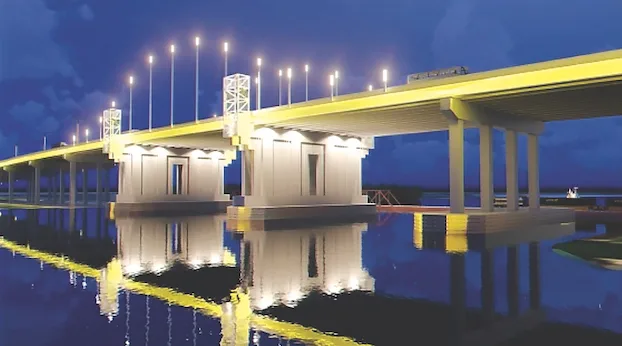I-10 bridge tolls ‘would sound a death knell to business’
Published 2:00 am Wednesday, August 23, 2023

- The proposed project is a 5.5-mile corridor going from near Ryan Street in Lake Charles to the I-210 and I-10 interchange on the west side of Lake Charles. (Louisiana Department of Transportation and Development)
The impact of Calcasieu River I-10 bridge tolls was discussed at a three-hour hearing Tuesday in Baton Rouge. Tolls are part of the plan proposed to build a new bridge to replace the current bridge built in the 1950s.
Joint Transportation Legislative Committee members will decide in favor of or against the proposal on or around Sept. 25.
Before that date – Thursday, Aug. 31, 4 p.m. to 7 p.m. – a public meeting is planned for the Lake Charles Civic Center regarding the proposed plan.
The purpose of the Tuesday meeting was to allow the Department of Transportation Secretary to fill in the Joint Transportation Legislative Committee on, and answer questions about the plan to accept the Public Private Partnership (PPP) proposal from Calcasieu Bridge Partners (CBP) to build the Lake Charles bridge and new approaches, service roads, etc. for $2.1 billion.
The bridge would be tolled for 50 years. The rate for local autos with tags, as proposed, starts at 25 cents. Medium and large trucks pay more.
That might sound like chump change to you, one local legislator told the Committee and DOTD Secretary, but it’s more than that to people who will cross the bridge twice a day to get to and from a job for wages that only allow for living from paycheck to paycheck.
Another legislator said the project, as proposed, would drive a stake in the heart of North Lake Charles.
Local trucking company owners testified the tolls would sound a death knell to business. The disparity in toll rates could even end in litigation, a past Louisiana Motor Transport Association president said.
State DOTD Secretary Eric Kalivoda told Committee Members that if the Joint Committee does not advance the PPP plan in September, the bridge would be deferred indefinitely. No PPP would want to do business here, ever.
He also told the Committee that the company who did not win the bid, and there were only two – walked away with a $2.7 million stipend. Paying a stipend is a common practice to bid losers, the Secretary said. and CPB would require the same stipend if their proposal isn’t accepted. He said it costs them millions in dollars to complete proposals.
Transportation committee Member Rodney Wayne Schamerhorn pointed out that tolls could get expensive, as the tolling company would have the opportunity to adjust them in accordance with the Consumer Price Index (CPI) over 50 years.
“I think we are jumping through hoops trying to push this thing through. If we push it back we can find other ways of looking at it. A million dollars was blown in the last few minutes of the legislative session that went to pet projects. We are going to toll everybody coming in and out of our state and residents, and all this money once they (the out of country and out of state contractors/investors) leave, the money will be leaving with them. I think this deserves a deeper look.”
State Rep. Phillip Tarver expressed his disappointment with (1) transparency regarding the plan, (2) the fact that no other alternatives were offered for consideration, (3)the problem with the ever-moving project estimate and the scope of the project, which goes beyond a bridge and drives up cost.
“This is the only plan that has ever been considered,” he said. “We’ve never looked at other possibilities, really. It’s been a one-track, P-3-determined and not-varied-from, all-or-nothing, now- or-never pressure to make a decision on a major thoroughfare by a single-minded approach that once again penalizes our citizens.”
Let’s build a bridge for the money we do have
Tarver said the estimate to complete the project has gone from $600 million to $800 million to $1.2 billion to $1.5 billion – that was March of this year – to $1.6 billion to $2.1 billion.
Earlier in the meeting, Kalivoda said the figures were reflective of 100 percent increases due to inflation over the last three years.
Tarver told the Committee of the DOTDs failure to apply for certain federal grant monies until being pressured to do so by the SWLA delegation. Tarver said he was told they did not plan to apply because the project was a PPP.
For the first time ever, local legislators found out that the bridge could be rehabbed for $100 to $200 million, which would allow it to last another 20 years.
So far, the state has only $225,000 in federal dollars, despite the promises of a past and current President that the bridge would be built.
“Our people deserve the chance to explore the possibility of building a bridge that the state can afford,” Rep. Les Farnum said. “The bridge over the Sabine is six lanes wide and I guarantee it didn’t cost billions to build.”
“Rep. Farnum usually says it, but he hasn’t so I’ll say it for him,” Tarver said “If all we’ve got is $1.3 million, then let’s build a $1.3 million bridge.”
Plenary tells Senator it could build bridge for $1.7 billion
Sen. Mark Abraham agreed with Tarver, saying he had been neutral up to this point.
“The transparency has not been as good as it could have been,” he said.
He chided the department for the lack of follow through on the Metropolitan organizational meetings as was the will of the people and the absence of toll projections that would allow a closer look at the possibility of discounts or no tolls for locals.
“Because of all of these questions, I feel we are probably rushing at this stage,” Senator Jeremy Stine said. “We just found out what the toll rates would be a few weeks ago.”
Senator Jeremy Stine said he had a phone conversation with Plenary, the leading investing company, who told him the bridge could be built for $1.7 billion.
“Again, there is that transparency issue,” he said, adding the plan, as proposed, could drive a stake through the heart of North Lake Charles.”
Fitzgerald Darbone is the president of the African American Chamber of Commerce in Lake Charles, and spoke on behalf of the 35 businesses located on Hwy. 171 North.
Using information from two separate studies, Darbone said at least half the drivers that use the I-10 bridge will begin to use the 210 bridge to avoid tolls and the other half of that traffic will be diverted by a second program in the works, the City’s plan for looping in 171 to the new bridge on the back end. Additionally, those North Lake Charles businesses have been recently assessed a 1 percent sales tax hike.
“You’ll kill North Lake Charles,” he said.
Trucking company owners testify
“The toll aspect and privatization of this project as proposed is one of the most expensive ways to build a road, “ said Randy Guillot, a third generation trucker. He said it is the obligation of this state to have adequate infrastructure in the most economical way possible and this isn’t it.
The difference in pricing between local autos and trucker rates could end up in litigation like it did in Rhode Island.
“It is a clear violation of the commerce clause,” he said.
Cully Frisard, CEO of Frisard’s Trucking Company told Committee members that they need to understand the impact of tolls to business. For his 130-employee business, the extra expense would mean layoffs. He trucks goods to grocery and retail chains. That would drive up prices.
Gary Gobert, Lake City Trucking attested to his early days in the business, a time when he “avoided every toll road in the country.”
He said more truckers would go out of their way a few miles to use the 210 bridge than the PPP company suggested,
“I’m not against tolls,” he said. “But toll roads should be a convenience, not on the Interstate Highway System that I have been paying taxes for roads, not to mention fuel taxes.”
Bob Hay, Hay Brothers Trucking, told committee members that he can’t really do an estimate on how the tolls would impact his business because the DOTD hasn’t spelled out exactly what is meant by a medium and large truck.
“Let’s talk about the economics of trucking,” said Brad Nelson, past president of the Louisiana Motor Transport Association.
The profit margin for companies is 10 percent – if the company is healthy. He spelled out how tolls would mean 0 profit for his company that hauls jet fuel to Chennault. He also said more trucks using the 210 bridge could mean more accidents.
Renee Amar, communications director for the Louisiana Transport Association, noted that the $3,000 tax credit for trucking companies, proposed for the first time in the Committee hearing, is a departure from several gubernatorial candidates’ suggestions that the state’s tax code needs to be simplified.
She also pointed out the states where PPP project investors have claimed bankruptcy and left the government holding the bag.


